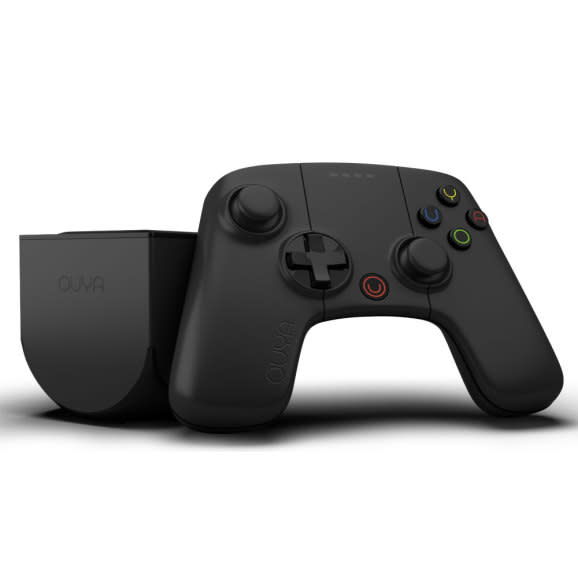Alibaba invests $10M in struggling Ouya amid rumors the Chinese megacorp is making its own console

The Kickstarter-funded Android microconsole that was going to change the gaming world may still do so … in China.
Alibaba, a gigantic Chinese Internet company, has invested $10 million in Android-console manufacturer Ouya, according to a Wall Street Journal report. This news comes less than a month after rumors surfaced that Alibaba is planning its own console or set-top box for its home game market, which soared to $18.5 billion in 2014. Now, it’s possible that Alibaba will integrate Ouya into that rumored system to provide the gaming backbone for that machine.
Ouya declined to comment or provide any specifics about the investment. We’ve also asked Alibaba for comment, and we’ll update this post with any new information.
While the size of China’s gaming industry is primarily due to a growing mobile sector, the country’s government also recently relaxed bans on gaming consoles. That led Microsoft to launch the Xbox One and Sony has plans of its own regarding the PlayStation 4 and China. Alibaba would have an advantage if it decides to take on those consoles with its own unit, and the inclusion of Ouya may even help it appeal to a wider audience than the Xbox One or PS4 ever could.
“Sometimes a new market, like China for game consoles, can leapfrog an established one,” Ouya chief executive Julie Uhrman told GamesBeat. “China’s advantage is that it lacks the baggage of the US console market.”
The Ouya console first debuted as a Kickstarter project in 2012. It promised to bring Android-style app gaming to televisions with a controller and all the trappings of traditional consoles. The idea caught on with fans who helped the crowdfunding campaign generate $8.6 million. The system finally started reaching customers in 2013, and it went on sale in stores later that year.
But the early excitement for the microconsole fizzled out almost immediately. The selection of games didn’t make Ouya a must-own system, and many people who backed the project ended up using it to play pirated apps or emulated Super Nintendo games. Developers who supported Ouya reported dismal sales, and since then Google, Amazon, and Smart TV makers have all introduced similar app-gaming elements that easily duplicate all of Ouya’s best features and more. That seemed to seal its fate.
Ouya’s response to its floundering console was to introduce a product that would let other companies use the Ouya Discover game store and interface on their hardware. That is potentially the part that Alibaba is interested in as China does not have the Google Play Android app market. Instead, even on smartphones, that country has dozens of competing places to download Android programs. Alibaba could introduce its own, Ouya-powered app store for televisions that it could go on to license to third-party partners.
Marketing technologist? We're studying the big marketing clouds. Fill out our 5-minute survey, and we'll share the data with you.

